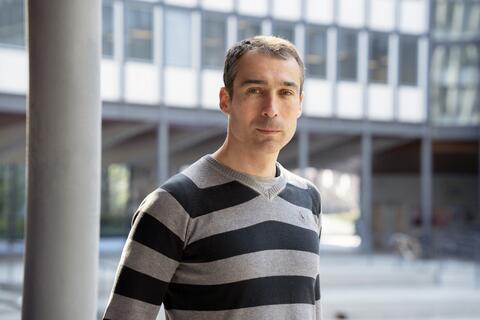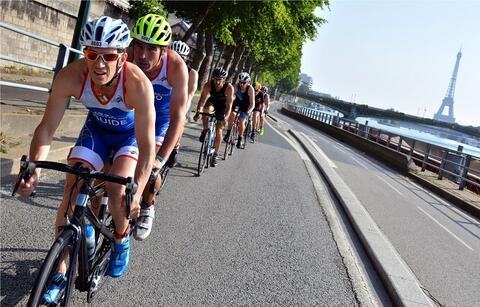
Ludovic Petitdemange
The sky at your fingertips
Visual impairment and scientific research are not incompatible.
Visually impaired since childhood, astrophysicist Ludovic Petitdemange multiplies the challenges. Deputy Director of Lerma, this high-level disabled athlete examines the invisible beats of the stars and works to make them accessible to those who only see clearly with the heart.
“I like challenges.” Fifth in a family of seven children from Nancy, Ludovic Petitdemange is one of those who likes to contradict destiny. Suffering from a genetic disease affecting the optic nerve, at the age of ten he lost his visual acuity in just three weeks. “I came from a fairly disadvantaged social background. My mother was a housekeeper and studying was not an option, he recalls. When the visual impairment arrived at the end of primary school, I had to review my ambitions." Promised for a football career at AS Nancy Lorraine, he first spent two years in a traditional college. Following difficult school inclusion due to his disability, he continued his education at the National Institute for Blind Youth (Inja) in Paris. Boarding until the final year, he managed to transform his handicap into strength. “Inja is the greatest social elevator!" says the researcher. "Among our siblings, only my brother and I, who were affected by the disease young, passed the baccalaureate and studied. The disability took us out of the neighborhood.”
The strength in numbers
From the last year of middle school, his physics teacher gave him a taste for research and the desire to pursue studies in astrophysics. After his scientific baccalaureate, Ludovic Petitdemange did a university degree in science at Jussieu (now Sorbonne University), before returning to Nancy for his bachelor's and master's degrees. “I didn’t put pressure on myself. I told myself that if I didn’t succeed, I would do something else,” he confides. At university, he developed compensation strategies, putting himself at the forefront of new technologies that existed to help him. He also focuses on group work: “In addition to the readers of the Student Health Handicap Relay who helped me reread my notes, I worked with a group of students. In class, I picked up the main thread of the lesson, while my classmates, who were very visual, only listened with one ear, but transcribed everything that I could not see on the board. We were complementary."
His work and tenacity are paying off. While he cannot carry out experiments and sees almost nothing in a telescope, the development of computing and automation opens the way to research in astrophysics. He continued with a DEA then a thesis at the laboratory for the study of radiation and matter in astrophysics and atmospheres (Lerma). Using massive digital simulation, he solves equations to better understand the internal dynamics of planets and stars. “I continued to apply the rule of give and take. I take care of the mathematical modeling while my colleagues take care of making the figures. Of course, it takes a lot of energy, but there are plenty of things you can do. It is the environment that makes us handicapped, but if things are adapted and we have found the right strategies, this reduces its impact,” indicates this father of two children.
Alongside his research activities and his responsibilities as deputy director of Lerma – a position which allows him to limit his time in front of screens – Ludovic Petitdemange transmits his passion. After his thesis, he devoted half of his teaching time, as a temporary teaching and research assistant, to the disability health relay: “I even taught a deaf student,” he remembers. "We communicated in writing, thanks to a voice synthesis which read to me what he wrote." An experience of inclusion that he continues at INJA. An active member of the institute's board of directors since 2019, he has taught courses to final year and science prep students for four years. “It’s important to show them that visual impairment and scientific research are not incompatible,” he adds.
The stars and the medals
A tenured researcher since 2011, the astrophysicist has not taken his eyes off his childhood dream: to become a high-level athlete. During his studies, he participated in the European and then the world blind football championships, and finished second in the European Espoir championships in the 400 meter handisport.
Paired sports are an excellent integration factor. They make it possible to create bridges between the world of the visually impaired and the able-bodied.
After a break, he returned to competitions in 2016, this time in a paratriathlon: white water swimming, tandem cycling and running. He competed guided by a sighted person. “Paired sports are an excellent factor of integration. They make it possible to create bridges between the world of the visually impaired and the able-bodied. We have incredible encounters,” emphasizes the researcher who finished third in the 2018 French paratriathlon championship and second in 2021. In 2018, he founded the A2Cmieux association to promote openness, bringing together the visually impaired to practice sporting activities with sighted people: “We support clubs to welcome the visually impaired and create pairs with their members,” he explains. We need guides at all levels in swimming, running and cycling because we have both visually impaired people returning to sport and people preparing for the Olympics.

Ludovic Petitdemange et son guide Dany à l’avant du tandem lors du triathlon de Paris, en 2018. © Frederic Poirier / A2Cmieux
As a member of the Paris departmental disabled sports committee, Ludovic Petitdemange also develops Parisian disabled sports clubs. For the 2024 Olympic Games, he hopes to change the way people with disabilities are viewed by forming pairs of sighted and visually impaired volunteers. “For each mission, it is the person with a disability who will become a caregiver for the public,” he adds.
Sharing with everone
And as high-level athlete, active in association, research and education are not enough to satisfy the appetite of this hyperactive 39-year-old, Ludovic Petitdemange is also involved in scientific mediation. After a three-year doctoral mission at the Palais de la Découverte where he led astronomy workshops for the general public, he specialized in mediation for the visually impaired during the World Year of Astronomy. With a collective, he contributes to making the various events accessible to all. In 2019, he became, alongside them, secretary of the Ciel d’Occitanie association whose objective is, ultimately, to create an inclusive observatory in Ariège. It organizes immersion stays during the Night of the Stars, with nearly 250 sighted and visually impaired participants at the Guinea Cape. “There is an emotional side to astronomy. 70% of visually impaired people are visually impaired¸ specifies the scientist. Putting these people in front of a telescope and making them point at the moon, and they are able to perceive even just differences in light, already generates an emotion in them.”
And for children and adults with disabilities who cannot travel, the association has created the Mobiloscope: a traveling entertainment truck equipped with a very large screen for the visually impaired and numerous adapted educational materials. There are notably models of galaxies and planets with the relief of mountains, craters and valleys, but also maps of the sky in Braille to allow visually impaired people to follow the walks in the sky with their fingertips. “Disability is case by case and we try to achieve the maximum of what each person can do,” he adds. With students, he also developed a program to simplify and print a photo of an observation in 3D. The person can thus see it with their fingers.
Continuing the combat
But Ludovic Petitdemange does not intend to stop there in the inclusion of people with disabilities. “We have just celebrated the 18th anniversary of the law on educational inclusion. But, despite coming of age, this law is still poorly applied. Long considered marginal, disability remains anecdotal in France. Very few able-bodied people have been around disabled people at school, unlike in Anglo-Saxon countries, in Sweden or the United States, for example.
"A Stéphane Hawking could not have emerged in France, whereas in England, we saw first his genius and then his illness. Moreover, out of the 200 pages of the research programming law, not once has the word disability been pronounced,” indicates the scientist who published an article on this subject in Le Monde in 2020 with a group of researchers with disabilities.
"A Stéphane Hawking could not have emerged in France, whereas in England, we saw first his genius and then his illness.
While he receives dozens of messages every week from parents of visually impaired students testifying to their academic difficulties, Ludovic Petitdemange is currently developing a collaborative training platform in scientific disciplines for young visually impaired students: “We need to change the scale. We must not only help the 150 students at Inja, but the 5,000 young people in this situation. We must also provide tools to the entire teaching staff, without making them experts in disability. The resources and course materials already exist. It now remains to centralize them at the national level." For his project, he has already obtained €70,000 from the National Union of the Blind and Visually Impaired and plans to be able to develop a first version of the platform by September 2023. A new challenge serving as many people as possible, led by this tireless fighter with enthusiasm.
